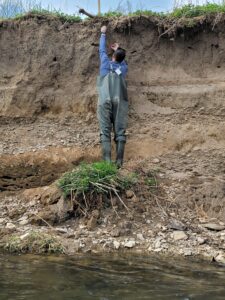YK Communities Invited to Participate in Climate Change Research
Lands in Focus: Presented by Calista Land & Natural Resources Department
Storyknife, Sept/Oct 2022 edition

Permafrost buckling in Nunapitchuk, courtesy AK Division of Geological & Geophysical Surveys (2018)
A team of scientists from multiple universities wants to team up with one or more Yukon-Kuskokwim Delta coastal communities to study climate change processes underway along Alaska’s coast.
The team is developing a large research project that will focus on impacts to infrastructure in Alaska coastal communities due to hazards including flooding, permafrost thaw and erosion.
At-risk infrastructure can include navigation channels, docks, runways, roads, buildings, and more. “It can be defined very widely,” says lead investigator Dr. Nina Stark, a geotechnical engineering professor at Virginia Tech.
In the Y-K Region, where many communities are threatened by flooding, permafrost thaw and erosion, this study could produce the kinds of data needed for future infrastructure projects or risk assessments.
“This data will be made public and can be submitted to agencies to ensure that community projects are designed with good information.”
Tisha Kuhns, Calista VP of Land and Natural Resources

Soil moisture measurements along an eroded riverbank after flooding, courtesy Nina Stark.
““This data will be made public and can be submitted to agencies to ensure that community projects are designed with good information. The more we know, the more we can work with others to protect our communities,” says Tisha Kuhns, Calista vice president of Land & Natural Resources.
Short-term benefits of participating in this study can include financial compensation to community members who help with research activities—like providing and operating a boat. Long-term benefits can include training and education for local students in climate change monitoring and data collection; local installation of monitoring equipment; and opportunities to coordinate directly with the research team to integrate local priorities into the study design.
Stark encourages communities interested in partnership opportunities to contact the research team at arci2@vt.edu. The project is in pre-development right now—with support from a National Science Foundation planning grant—with a goal of submitting for funding in Spring 2023.
Stark says, “Ideally we will have the participating communities confirmed by then.”